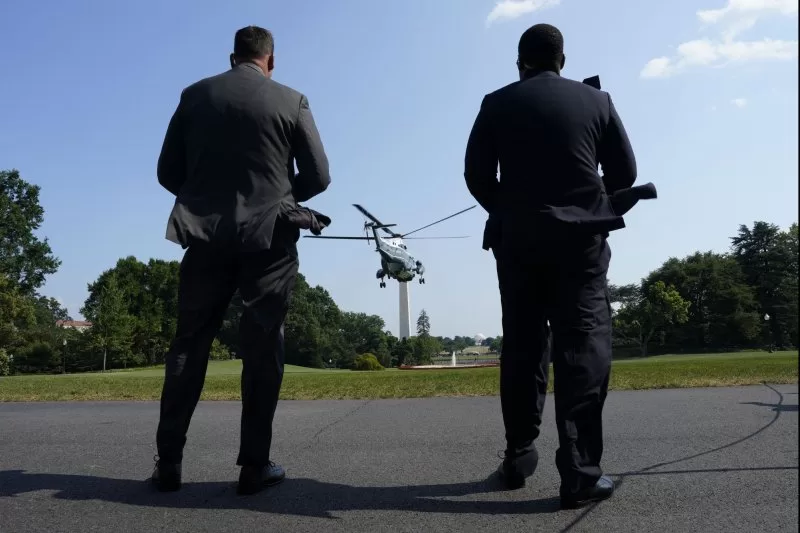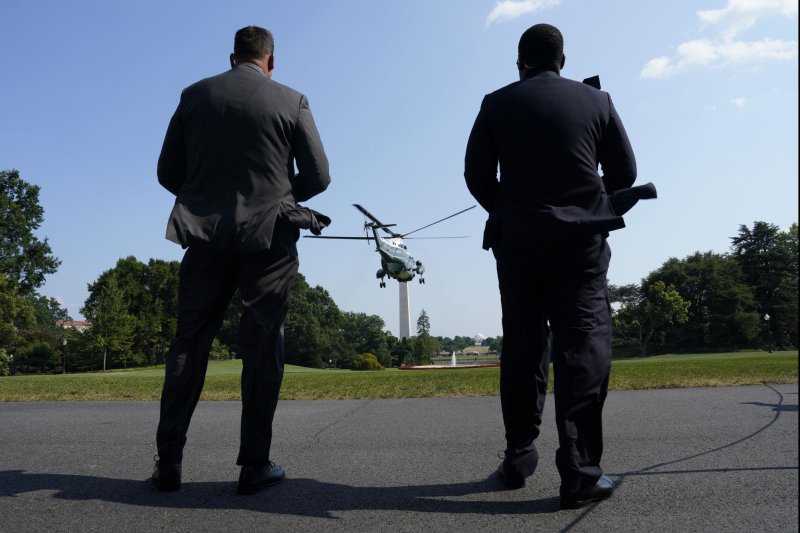1 of 3 | Secret Service agents watch as Marine One helicopter with President Joe Biden on board departs from the South Lawn of the White House in Washington, D.C., as he departs to Las Vegas on July 15. Photo by Yuri Gripas/UPI |
License PhotoJuly 29 (UPI) — The U.S. Secret Service’s most visible role is standing guard over current and former presidents, but it is just one of its duties.
The spotlight is on the Secret Service after the failed assassination attempt on former President Donald Trump in Butler, Pa., on July 13. Secret Service Director Kimberly Cheatle resigned amid an investigation into the incident.
Sen. Cortez Masto, D-Nev., and Sen. Chuck Grassley, R-Iowa, proposed that the next director of the Secret Service be confirmed by the Senate. Their legislation to enact this policy has not yet been introduced.
“The Secret Service is a critically important law enforcement agency, and it’s past time we started treating it that way,” Masto said in a statement. “By making the Secret Service Director a Senate-confirmed position, our bipartisan PROTECT Act will ensure the same level of oversight as other federal law enforcement agencies and support our hardworking agents in doing the best job they can. We can’t accept anything less.”
Not all presidential candidates receive protective detail from the agency. A committee sets the criteria to receive protection, which is typically reserved for candidates who have received a nomination from one of the two main political parties.
The president can issue an executive order to authorize the protection of others.
President Joe Biden‘s administration granted independent presidential candidate Robert F. Kennedy Jr. Secret Service protection earlier this month. The decision came two days after the shooting at the Trump rally in Pennsylvania.
Civil rights and racial justice advocate Cornel West, who is also running for president, has requested protection as well.
Other prominent officials, such as cabinet members, are given Secret Service protection.
Special Agent Joseph Routh spoke with UPI to share the many responsibilities of the Secret Service as well as a look at what the life of an agent is like.
“It’s a mission. It’s not a job,” Routh said. “You’re very much fully engaged in your role and your mission to the agency.”
The Secret Service was founded in 1865 with the mission of investigating and curbing the use of counterfeit currency. Investigating financial crimes remains one of the main duties of the agency.
The agency’s investigative role expanded substantially as the Internet was widely adopted. President George W. Bush increased the responsibility of protecting the United States’ financial infrastructure. The agency also investigates ransomware, network hacking and other cybercrimes.
“If it touches a computer, we’ll investigate it,” Routh said.
It was not until the assassination of President William McKinley in 1901 that protection of the president became a focus of the Secret Service. That protection extends to members of the president’s family, former presidents and their families and presidential candidates.
Former presidents can decline Secret Service protection and opt for protection from a private firm. Routh said he is not aware of anyone doing this.
Foreign heads of state are also assigned protective detail when they visit the United States.
Routh describes working for the agency as a commitment that requires a deep sense of duty and focus. Agents are assigned to a detail, such as protecting the sitting president, for four to six years. That protective detail is to the office, not the person serving in it. So if there is a change in the White House, the agent remains put.
Agents do have downtime. Training and continuing education are intensive but there is still room for family and free time.
There is not one specific path to becoming a Secret Service agent. Many agents are former military members or athletes. There are a number of agents with degrees in criminal justice or business as well.
“I wouldn’t pigeonhole us into one area. We accept everybody,” Routh said. “If you have a college degree and want to do the job, we will train you if you’re up to the job.”
Agents are trained at the Federal Law Enforcement Training Centers in Glynco, Ga, for three months. Training continues for the next four months in Beltsville, Md., where they focus on agency policies and procedures.

